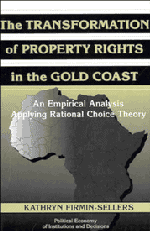 The Transformation of Property Rights in the Gold Coast
The Transformation of Property Rights in the Gold Coast Book contents
- Frontmatter
- Contents
- Series editor' preface
- Preface
- Acknowledgments
- Chapter 1 Introduction
- PART I THE INSTITUTIONS OF THE COLONIAL STATE
- Chapter 2 The logic of indirect rule
- PART II THE REINVENTION OF TRADITION: THE EVOLUTION OF PROPERTY RIGHTS UNDER INDIRECT RULE
- PART III THE TRANSITION TO INDEPENDENT GOVERNMENT
- Notes
- Bibliography
- Index
Chapter 2 - The logic of indirect rule
Published online by Cambridge University Press: 08 January 2010
- Frontmatter
- Contents
- Series editor' preface
- Preface
- Acknowledgments
- Chapter 1 Introduction
- PART I THE INSTITUTIONS OF THE COLONIAL STATE
- Chapter 2 The logic of indirect rule
- PART II THE REINVENTION OF TRADITION: THE EVOLUTION OF PROPERTY RIGHTS UNDER INDIRECT RULE
- PART III THE TRANSITION TO INDEPENDENT GOVERNMENT
- Notes
- Bibliography
- Index
Summary
The story of the transformation of customary land tenure in West Africa begins with the imposition of colonial rule. Colonial rule established the framework within which indigenous actors operated. Colonial institutions created the channels through which local actors could gain access to British decision-making; designated which groups of indigenous actors would be eligible to work through those channels; and allocated responsibilities between national and local level institutions. Colonial institutions thus shaped the strategies that indigenous and European actors used to redefine property rights to land, and they determined the actors' capacity to enforce those rights at the state or local level.
In this chapter, I explore the logic of indirect rule. First, I ask how British officials defined their goals in West Africa, and consider the institutions they forged to realize those goals. I then assess the institutions' impact on indigenous and European efforts to redefine property rights to land and claim a now-valuable resource.
THE LOGIC OF INDIRECT RULE
It is difficult to ascribe a single motivating force to the creation of the British empire. Nevertheless, the search for economic profit clearly played a large role in the British colonization of West Africa and other regions. West Africa offered a new and potentially expansive market to European traders, and an abundant supply of inexpensive raw materials to European manufacturers. The British colonial government sought to exploit these opportunities by creating an environment in which trade and commercial agricultural production would thrive.
- Type
- Chapter
- Information
- The Transformation of Property Rights in the Gold CoastAn Empirical Study Applying Rational Choice Theory, pp. 21 - 32Publisher: Cambridge University PressPrint publication year: 1996
- 1
- Cited by
